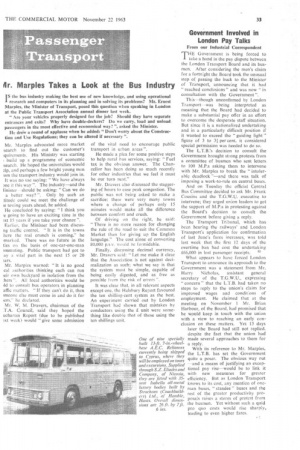4r. Marples Takes a Look at the Bus Industry
Page 35

If you've noticed an error in this article please click here to report it so we can fix it.
IS the bus industry making the best use of new knowledge, and using operational 1 research and computers in its planning and in solving its problems? Mr. Ernest Marples, the Minister of Transport, posed this question when speaking in London at the Public Transport Association annual dinner last week.
"Are your vehicles properly designed for the job? Should they have separate entrances and exits? Why have double-deckers? Do we carry, load and unload passengers in the most effective and economical way?", asked the Minister. He drew a round of applause when he added: "Don't worry about the Construction and Use Regulations; they can be altered if necessary ".
Mr. Marples advocated more market 'search to find out the customer's quirements. His Ministry was starting build up a programme of economic ;search. He hOped the universities would 1p, and perhaps a few bright young men om the transport industry would join in. It was no use saying: "We have always me it this way ". The industry—and the Enlister –should be asking: "Can we do a better way? ". Only by such an titude could we meet the challenge of le testing years ahead, he added.
He concluded by saying: "I think you e going to have an exciting time in the at 15 years if you take your chance". Earlier, the Minister had been discusrig traffic control. "It is in the towns here the real crunch is coming," he :marked. There was no future in the ties on the basis of one-car-one-man ramming. Public transport had got to ay a vital part in the next 15 or 20 tars.
Mr. Marples warned: "It is no good cal authorities thinking each can run Leir own backyard in isolation from the hers ". All local authorities would be ■ id to consult bus operators in planning affic matters. " If they can't do it, then nneonc else must come in and do it for Lem," he declared.
Mr. W. M. Dravers, chairman of the T.A. Council, said they honed the uchanan Report (due to be published :xt week) would "give some admission
of the vital need to encourage public transport in urban areas".
He made a plea for some positive steps to help rural bus services, saying: " Fuel tax is the obvious answer. The Chancellor has been doing so much recently for other industries that we feel it must be our turn next."
Mr. Dravers also discussed the staggering of hours to ease peak congestion. The public was not being asked to make a sacrifice; there were very many towns where a change of perhaps only 15 minutes would make all the difference between comfort and crush.
Of driving on the right, he said: "There is no more reason for changing the rule of the road to suit the Common Market than for giving up the English language." The cost alone of converting 80,000 p.s.v. would he formidable.
Finally, discussing decimal currency, Mr. Dravers said: "Let me make it clear that the Association is not against decimalization as such; what we say is that the system must be simple, capable of being easily digested, and as free as possible from the risk of errors ".
It was clear that, in all relevant aspects except enc. the Halsbury Report favoured the ten shilling-cent system as the best. An experiment carried out by London Transport had shown that mistakes by conductors using the £ unit were something like double that of those using the ten shillings unit.




































































































